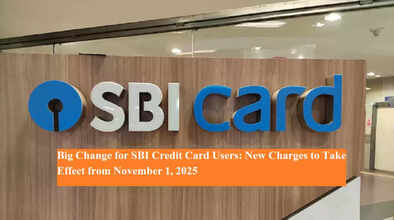Big Change for SBI Credit Card Users: New Charges to Take Effect from November 1, 2025

India’s largest credit card issuer, SBI Card, has announced a major revision in its charges and fee structure, effective from November 1, 2025. The new rules will especially impact users who make education-related payments or load money into digital wallets through their SBI Credit Cards. From next month, these transactions will attract an additional 1% fee, making certain online payments costlier for millions of cardholders.
Extra 1% Fee on School and College Fee Payments via Third-Party Apps
As per the official communication from SBI Card, customers who pay school, college, or educational institution fees through third-party apps such as Paytm, PhonePe, Razorpay, or similar platforms will now have to bear a 1% transaction charge.
However, there’s good news for those who make payments directly through the school or college’s official website or at on-campus POS (Point of Sale) machines — these transactions will remain free of any additional charge.
This change means parents and students using fintech apps for convenience may soon face slightly higher education-related expenses each month.
Charges on Loading Digital Wallets Above ₹1,000
The new structure also introduces a 1% fee for wallet top-ups exceeding ₹1,000. For example, if a user adds ₹2,000 to their Paytm Wallet or Amazon Pay, an additional ₹20 will now be deducted as a fee. This effectively means the wallet will receive ₹1,980 instead of ₹2,000.
This move aims to discourage excessive wallet funding via credit cards, as many users take advantage of reward points and credit cycles for wallet-based transactions.
Other Key SBI Credit Card Charges You Should Know
The revised structure doesn’t stop at education and wallet payments. SBI Card has also outlined updates for cash payments, payment dishonors, and card replacement charges.
-
Cash Payment Fee: If customers choose to pay their credit card bill in cash at a branch, a ₹250 fee will be applicable.
-
Payment Dishonor Fee: If a payment fails or bounces, users will be charged 2% of the payment amount or ₹500, whichever is higher.
-
Cheque Payment Fee: Payments made via cheque will now incur a ₹200 charge.
-
Cash Advance Fee: Withdrawals from ATMs in India or abroad will attract a 2.5% charge (minimum ₹500) per transaction.
-
Card Replacement Fee: Replacement of lost or damaged cards will cost between ₹100 and ₹250, depending on the card type. For premium Aurum cards, the fee can go up to ₹1,500.
Why SBI Card Made These Changes
Industry experts believe the new fees are designed to reduce operational costs and control misuse of credit cards for non-retail transactions. Many customers use credit cards to load wallets or pay institutional fees, which can create complications in the banking system’s settlement process.
By introducing these small charges, SBI Card aims to encourage direct and compliant payment routes while maintaining transparency and financial discipline among users.
What Cardholders Should Do
To avoid unnecessary charges, SBI Card users are advised to:
-
Pay school or college fees directly through official portals or POS machines.
-
Keep wallet top-ups under ₹1,000 to avoid the 1% fee.
-
Avoid paying credit card bills via cash or cheque; use net banking, auto-debit, or UPI instead.
These steps can help minimize extra costs while continuing to enjoy the convenience and rewards that SBI Cards offer.
Final Takeaway
The upcoming rule change from November 1, 2025, marks one of SBI Card’s most significant updates in recent years. While the new fees might feel like a burden to some users, they also encourage more responsible credit usage and secure digital payment habits.
In summary, paying education fees or loading wallets with your SBI Credit Card will now come at a cost — so it’s time to plan your transactions wisely and stay informed to avoid unnecessary charges.

